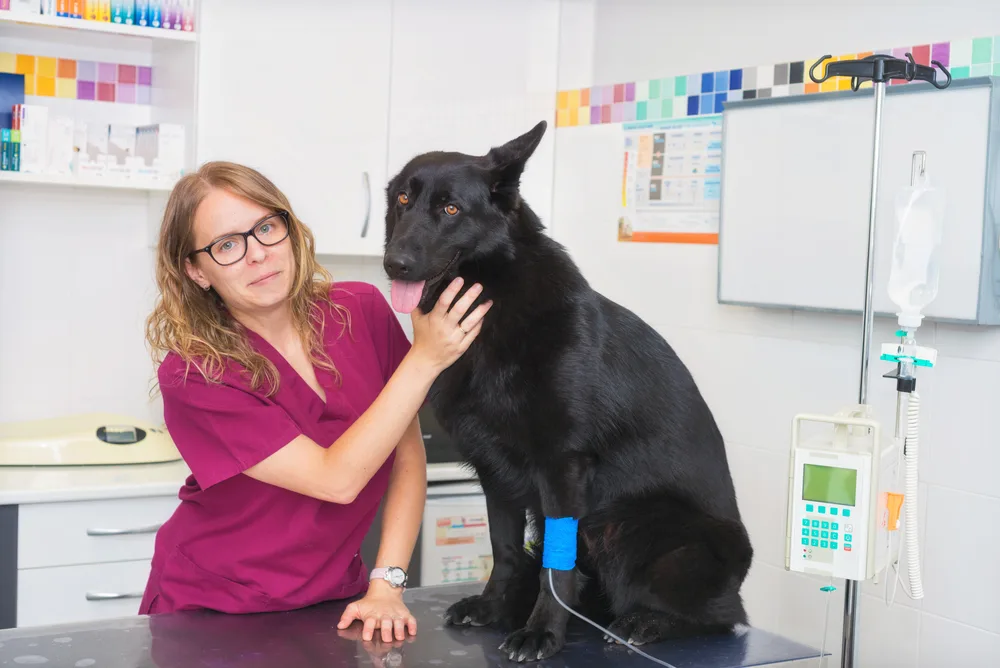Medically Reviewed by Dr. Majid Tanveer, DVM
Pancreatitis is a potentially life-threatening condition that can affect dogs. Dog owners must be aware of the signs and symptoms of pancreatitis, mainly if their dog is prone to it or likes to snack on fatty treats behind their back.
Knowing what to look for and understanding the available remedies and treatments can help ensure a swift and successful recovery. So what is pancreatitis in dogs, and what do you need to know?
Pancreatitis is an inflammation of the pancreas, the organ responsible for producing insulin, and enzymes that help digest food. In dogs, pancreatitis can be severe and life-threatening and lead to symptoms such as lethargy, abdominal pain, decreased appetite, vomiting, and diarrhea. It may be acute or chronic.
Let’s go into more detail on signs, causes, and treatments for pancreatitis in dogs.
Symptoms of Pancreatitis in Dogs
Dog owners must be aware of the warning signs of pancreatitis in their dogs before it becomes a life-threatening emergency.
Unfortunately, these signs can often be easily overlooked or misinterpreted as less severe than they are.
The most common signs of pancreatitis in dogs include:
- Decreased appetite: This is usually one of the first indicators of pancreatitis. You should take it seriously if your dog misses several meals.
- Lethargy and weakness: If your pup is suddenly more tired, less active, or sleeping longer than usual, it could be a sign of pancreatitis.
- Repeated vomiting is a sign that the pancreas releases excessive digestive enzymes into GIT.
- Diarrhea: Chronic diarrhea with loose and watery stools.
- Swollen abdomen: The inflammation of the pancreas can cause swelling in the belly area.
- Posture: The dog may be hunched up to soothe abdominal pain caused by inflammation.
- Dehydration: Look for signs such as dry eyes, nose, and gums, as well as sunken eyes.
- Jaundice: This signifies that too many digestive enzymes are entering the bloodstream.
- Weight loss: Unintentional weight loss can result from pancreatitis.
If your pooch experiences any of these signs or symptoms, it is essential to take them to the vet immediately. The earlier you catch pancreatitis in dogs and begin treatment, the better their chances of a full recovery.
Causes of Pancreatitis in Dogs

Imagine a time-release capsule opening too soon and releasing its contents before it reaches its intended destination. This is what happens when your dog has pancreatitis.
Instead of going through the pancreatic duct into the duodenum (part of the small intestine) to get activated. These inactive enzymes are prematurely activated within the pancreas.
This leads to the beginning of the digestion process in an inappropriate place: the pancreas. This can cause inflammation, pain, and damage to your dog’s pancreas.
Pancreatitis can be caused by various factors, including:
Poor Quality Diet
An unbalanced diet high in fats and low in other essential nutrients can lead to inflammation of a dog’s pancreas. Human food such as table scraps, bones, or even fatty snacks is often too rich for a canine digestive system, potentially resulting in pancreatitis.
Trauma or Injury
Any form of trauma or injury to the abdomen, such as abdominal surgery or blunt force trauma, can cause the pancreas to become inflamed. This is because an injury may trigger inflammation in all tissues surrounding the injured area, including the pancreas.
Genetics
Certain breeds of dogs may be genetically predisposed to developing pancreatitis, such as Schnauzers and Cocker Spaniels. This means the condition may be inherited from previous generations and can affect a dog’s health even if they’ve never had any problems.
Owners of these breeds need to watch their dog’s diet closely and monitor them for any signs or symptoms.
Obesity
Excessive weight can make dogs more prone to developing pancreatitis. This is because an obese dog has a higher fat content in its body, which means the pancreas must produce more enzymes to break down that fat. Too much strain on the organ can lead to inflammation and pain.
Certain Medications and Supplements
Certain medications, such as steroids, anti-seizure drugs, antibiotics, and chemotherapy, can lead to pancreatitis in dogs. These drugs directly damage the pancreas or interfere with its normal functioning.
Some examples are:
- Phenobarbital
- Azathioprine
- Thiazide Diuretics
- Calcium
- Potassium Bromide
- Cholinesterase Inhibitors
- Estrogen
- Salicylates
- Vinca Alkaloids
Toxins
Toxins such as chocolate, lilies, zinc, and organophosphates can cause pancreatitis in dogs.
- Chocolate contains theobromine which is toxic to dogs. It may lead to vomiting, diarrhea, increased urination or thirst, liver or kidney damage, or seizures.
- Lilies contain oxalic acid, which can damage the digestive system and be fatal if consumed in large quantities.
- Zinc is toxic to dogs and can be found in zinc-coated galvanized products like metal objects.
- Organophosphates are a group of insecticides that can cause vomiting, diarrhea, seizures, or even death if ingested by dogs.
Hypothyroidism
Hypothyroidism is caused by an underproduction of thyroid hormones, which can lead to pancreatitis in dogs.
This can happen when the dog’s immune system mistakenly attacks and destroys its thyroid tissue, decreasing circulating thyroxine levels.
Symptoms include weight gain, lethargy, and poor coat condition.
Cancer
Cancer can also contribute to pancreatitis in dogs. Tumors of the pancreas can cause inflammation and damage, leading to pain, difficulty swallowing, or even vomiting.
If a tumor is found, it should be removed by a qualified veterinarian as soon as possible.
Obstruction of the Pancreatic Outflow Tract
Biliary stones or tumors in the pancreatic duct can block off this pathway. This stops the release of enzymes and causes them to become trapped in the pancreas and activated, leading to inflammation.
Diabetes Mellitus
Diabetes mellitus is a common cause of pancreatitis in dogs. The condition occurs when the pancreas does not produce enough insulin, resulting in an elevated blood sugar level which can trigger inflammation and damage to the pancreas.
Managing the condition as soon as possible is essential no matter what the cause of your dog’s pancreatitis may be.
Diagnosis of Pancreatitis in Dogs

Diagnosis of pancreatitis in dogs is essential to identify the underlying cause and determine an appropriate course of treatment.
Diagnosing pancreatitis can be challenging as symptoms may not always be prominent or persistent. It is important to note that a veterinarian should always confirm a diagnosis of pancreatitis.
Diagnosis of pancreatitis in dogs is determined based on the following:
- Medical history
- Physical examination
- Laboratory tests
Medical History
The medical history of the dog is vital in diagnosing pancreatitis. Veterinarians are likely to ask questions about the dog’s diet, recent illnesses or surgeries, any medications they may be taking, and genetics.
Physical Examination
Physical examinations of a dog showing signs of pancreatitis involve checking for signs such as:
- Abdominal distension
- Diarrhea and vomiting
- Pain on palpation
- Jaundice
- Dehydration
Blood Tests
Blood work can be a crucial tool in determining the activity levels of certain enzymes produced by the pancreas. For example, Amylase, lipase, trypsin, and chymotrypsin are elevated when pancreatitis occurs.
It also allows for measuring blood glucose and insulin concentrations that may indicate pancreatic inflammation.
SPEC-CPL Test
The SPEC-CPL test, or Specific Canine Pancreatic Lipase assessment, is a fast and effective way to determine if your dog has pancreatitis quickly. It checks the activity of enzymes in the pancreas, providing more accurate results than other tests alone.
X-rays
Abdominal X-rays are not very useful in determining the presence of pancreatitis in dogs. Yet, they become vital when a dog is vomiting as it allows us to check if foreign objects obstruct the stomach and intestine (e.g., something like a toy squeaker!).
Ultrasound
Abdominal ultrasound is the most reliable way to image the pancreas. However, to successfully diagnose pancreatitis, tissues must have a significant amount of abnormality.
Treatments For Pancreatitis In Dogs

Treatment of pancreatitis in dogs is based on the severity of the condition and any underlying causes. Generally, treatment aims to reduce inflammation and restore normal organ function.
Treatment usually consists of IV fluids and medications to:
- Reduce inflammation
- Prevent further damage to the pancreas
- Support digestion
Moderate to Mild Pancreatitis
Supportive care such as dietary changes, rest, and medication may be recommended to combat mild cases of pancreatitis in dogs. Your vet might also prescribe specific medications to manage or prevent the condition. With these measures, you can keep your pup healthy and happy.
Severe Pancreatitis
Severe pancreatitis may need hospitalization with intensive treatments, such as:
- Intravenous (IV) fluid and electrolytes to maintain hydration and regulate blood chemistry.
- Pain management with appropriate medications to reduce discomfort.
- Antiemetic medications to control nausea and vomiting.
- Stomach-protective medications such as proton pump inhibitors or H2 blockers reduce gastric acid production.
- Nutritional support with a feeding tube ensures adequate caloric intake and provides vital nutrients.
- Antibiotic therapy when indicated to treat or prevent infections.
- Surgery may be necessary to remove damaged tissue or repair any abdominal damage caused by pancreatitis.
Frequent blood tests and close monitoring are necessary to detect potential complications such as:
- Hypoglycemia
- Electrolyte imbalances
- Organ failure
Make sure to give your dog all the medicines the veterinarian prescribes and provide continued care throughout his recovery.
What Is the Prognosis for Pancreatitis in Dogs?
The prognosis for pancreatitis in dogs varies depending on the severity of the condition.
Mild cases of pancreatitis typically respond well to treatment, and many dogs fully recover. Treatment may be more intensive for severe cases, and long-term care may be necessary.
The outlook for dogs with pancreatitis is generally favorable. Early treatment and appropriate care can lead to a full recovery. However, recurrent bouts may occur.
So it’s essential to work closely with your vet to identify potential triggers and manage the condition.
Prevention of Pancreatitis in Dogs
As a veterinarian and devoted dog owner, I believe that precaution is superior to cure. When discussing pancreatitis in dogs, some helpful strategies can help avert its occurrence:
- Provide your dog with a healthy, nutritionally balanced diet.
- Avoid giving your human foods or fatty treats that can cause pancreatitis.
- Ensure your pup gets enough exercise daily to maintain a healthy weight and lifestyle.
- Monitor changes in eating habits or activity levels, as these could be symptoms of underlying problems.
- Have regular checkups with your veterinarian to ensure your dog is healthy.
- If your dog has a history of pancreatitis, feed him high-quality food without artificial preservatives or fillers.
Follow these tips to help ensure the health and well-being of your beloved dog. Keeping an eye out for signs of sickness or distress is vital to helping your pup lead a happy and healthy life.
Pet Care Tip: Are you looking for an easy way to provide your pup with a nutritious, balanced diet to prevent pancreatitis? Check out this helpful video on how to make healthy food choices right at home.
Frequently Asked Questions
Is chicken OK for dogs with pancreatitis?
To stay healthy, dogs with pancreatitis can enjoy boiled chicken, low-fat beef, egg whites, yogurt, barley, and cooked veggies!
What is the death rate from pancreatitis?
Mild acute pancreatitis has very low mortality rates (less than 1%). But, death can occur between 10-30% in severe cases. Understanding the environment in which it develops is essential, as it may impact outcomes.
How long does pancreatitis last in dogs?
Pancreatitis in dogs can last from a few days to several weeks. But It depends on the severity of the condition and the promptness of treatment. In mild cases, symptoms may resolve within 2-4 days with rest and medical management. In more severe cases, it could take 2-3 weeks or months to recover fully.
